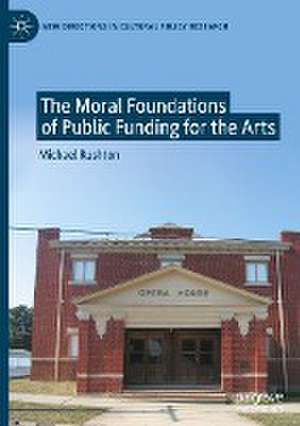The Moral Foundations of Public Funding for the Arts: New Directions in Cultural Policy Research
Autor Michael Rushtonen Limba Engleză Hardback – 27 iun 2023
Din seria New Directions in Cultural Policy Research
- 20%
 Preț: 876.53 lei
Preț: 876.53 lei - 15%
 Preț: 464.50 lei
Preț: 464.50 lei -
 Preț: 389.70 lei
Preț: 389.70 lei - 18%
 Preț: 725.92 lei
Preț: 725.92 lei -
 Preț: 382.75 lei
Preț: 382.75 lei - 15%
 Preț: 640.06 lei
Preț: 640.06 lei - 15%
 Preț: 640.55 lei
Preț: 640.55 lei - 15%
 Preț: 502.22 lei
Preț: 502.22 lei -
 Preț: 383.33 lei
Preț: 383.33 lei - 15%
 Preț: 527.66 lei
Preț: 527.66 lei - 15%
 Preț: 581.33 lei
Preț: 581.33 lei - 15%
 Preț: 527.97 lei
Preț: 527.97 lei - 18%
 Preț: 775.65 lei
Preț: 775.65 lei - 15%
 Preț: 637.78 lei
Preț: 637.78 lei -
 Preț: 242.00 lei
Preț: 242.00 lei - 18%
 Preț: 722.43 lei
Preț: 722.43 lei - 18%
 Preț: 892.74 lei
Preț: 892.74 lei - 18%
 Preț: 893.71 lei
Preț: 893.71 lei
Preț: 780.19 lei
Preț vechi: 951.46 lei
-18% Nou
Puncte Express: 1170
Preț estimativ în valută:
149.28€ • 155.88$ • 123.28£
149.28€ • 155.88$ • 123.28£
Carte tipărită la comandă
Livrare economică 15-29 aprilie
Preluare comenzi: 021 569.72.76
Specificații
ISBN-13: 9783031351051
ISBN-10: 3031351053
Pagini: 185
Ilustrații: XIII, 185 p.
Dimensiuni: 148 x 210 mm
Greutate: 0.39 kg
Ediția:2023
Editura: Springer International Publishing
Colecția Palgrave Macmillan
Seria New Directions in Cultural Policy Research
Locul publicării:Cham, Switzerland
ISBN-10: 3031351053
Pagini: 185
Ilustrații: XIII, 185 p.
Dimensiuni: 148 x 210 mm
Greutate: 0.39 kg
Ediția:2023
Editura: Springer International Publishing
Colecția Palgrave Macmillan
Seria New Directions in Cultural Policy Research
Locul publicării:Cham, Switzerland
Cuprins
1 Introduction.- 2 The Economic Method.- 3 Liberalism, Neutrality, and the Arts.- 4 Egalitarianism and Public Funding for the Arts.- 5 Communitarianism.- 6 Conservatism.- 7 Multiculturalism.- 8 Keynes’s Grandchildren.
Notă biografică
Michael Rushton teaches in the Arts Administration program in the O’Neill School of Public and Environmental Affairs at Indiana University, and is Co-Director of its Center for Cultural Affairs.He is the author of Strategic Pricing for the Arts (2014) and the editor of Creative Communities: Art Works in Economic Development ( 2013), and has published articles on all aspects of cultural affairs, including copyright, freedom of expression, public funding of the arts, the role of nonprofit organizations, tax policy and the arts, authors’ legal rights, and the arts and local economic development, spanning a career in this subject area of twenty-five years.
Textul de pe ultima copertă
"This book is an essential contribution to our field; it offers both a synthesis of the moral foundations of arts funding through different philosophical traditions, and an original outlook and interpretation of the subject matter."─Jonathan Paquette, University of Ottawa, Ontario, Canada
This book provides a detailed account, and critique, of diverse approaches to the arts funding question, with a focus on the arm’s length arts councils that are the norm in the Anglo-American world. It builds on economic methods, the liberal-egalitarian framework of John Rawls, the communitarian opposition to the liberal framework, the capabilities approach to equality, and the cultural conservatism of Roger Scruton and others. In each case, the book considers the very practical aspect of public funding of the arts, namely, what are the implications for what ought to receive priority, and what parts of the cultural world are best left to their own, private sector, devices. It is nota work of “arts advocacy”. Rather, the book challenges assumptions, and sparks critical debate in the field.
Michael Rushton teaches in the Arts Administration program in the O’Neill School of Public and Environmental Affairs at Indiana University, and is Co-Director of its Center for Cultural Affairs.He is the author of Strategic Pricing for the Arts (2014) and the editor of Creative Communities: Art Works in Economic Development (2013), and has published articles on all aspects of cultural affairs, including copyright, freedom of expression, public funding of the arts, the role of nonprofit organizations, tax policy and the arts, authors’ legal rights, and the arts and local economic development, spanning a career in this subject area of twenty-five years.
This book provides a detailed account, and critique, of diverse approaches to the arts funding question, with a focus on the arm’s length arts councils that are the norm in the Anglo-American world. It builds on economic methods, the liberal-egalitarian framework of John Rawls, the communitarian opposition to the liberal framework, the capabilities approach to equality, and the cultural conservatism of Roger Scruton and others. In each case, the book considers the very practical aspect of public funding of the arts, namely, what are the implications for what ought to receive priority, and what parts of the cultural world are best left to their own, private sector, devices. It is nota work of “arts advocacy”. Rather, the book challenges assumptions, and sparks critical debate in the field.
Michael Rushton teaches in the Arts Administration program in the O’Neill School of Public and Environmental Affairs at Indiana University, and is Co-Director of its Center for Cultural Affairs.He is the author of Strategic Pricing for the Arts (2014) and the editor of Creative Communities: Art Works in Economic Development (2013), and has published articles on all aspects of cultural affairs, including copyright, freedom of expression, public funding of the arts, the role of nonprofit organizations, tax policy and the arts, authors’ legal rights, and the arts and local economic development, spanning a career in this subject area of twenty-five years.
Caracteristici
Provides a comprehensive analysis of why government funds the arts Draws from economic methods and various philosophical frameworks Offers practical considerations for public funding of the arts
